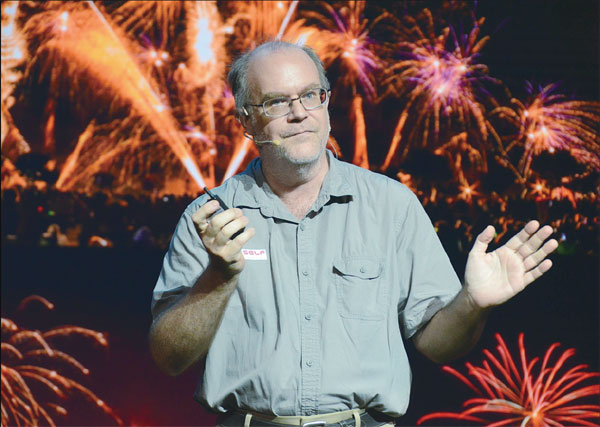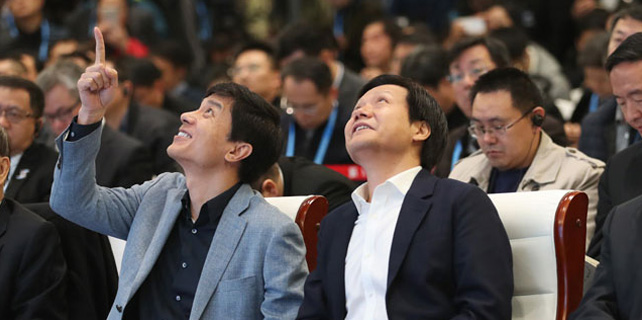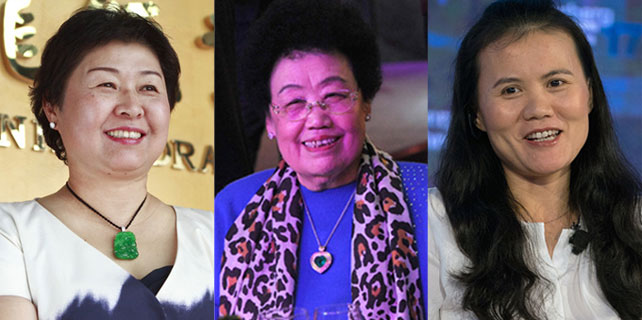Tinkering his way to innovation
Theodore Gray abandoned an academic path to co-found a software company and write best-sellers that explain science to nonscientists
After co-founding Wolfram Research, a software company in central Illinois that makes technical computing program Mathematica and the search engine Wolfram Alpha, which is incorporated into Apple's Siri, Theodore Gray also wrote a series of science books and apps that are best-sellers around the world.
His first book, The Elements, which describes each chemical element in detail with beautiful photos, was published in December 2009. The book was on the list of 100 books recommended by China's Ministry of Education in 2012 and has sold more than 1.5 million copies in 25 languages worldwide.
|
Theodore Gray speaks at the Science, Education, Life and Future (SELF) forum sponsored by the Computer Network Information Center and Bureau of Science and Communication of the Chinese Academy of Sciences, in Beijing last year. Provided to China Daily |
A follow-up book, Molecules, explains how atoms combine. Reactions was published in December 2017, and a book on how machines work will be published in 2019. Both The Elements and Molecules were New York Times best-sellers in 2014.
In January 2010, a month after The Elements was published, Apple announced that the first iPad would go on sale around two months later. The day after the announcement, Apple CEO Steve Jobs called Gray, asking if he wanted one of about 30 prototype iPads.
"At the time (before the iPad's release), this was a deep, dark secret. It was actually bolted into a big clunky case, so you couldn't tell how thick it was, how much it weighed. You could just get to the screen," Gray says. "Two people from Apple came holding this thing. We had to identify a special room with a lock that only I and one other person had the key to. They came with a chain, locked it down to a desk, and they took the key. We could not tell anybody.
"I realized that Apple had a marketing problem with the iPad. Kindle was pretty well established at the time. (The) iPad was going to be great for surfing the web, but as an e-book reader, it was going to (miss the mark). I showed Jobs our Elements app as it was shaping up. I said that what you need to do is tell people that this is the future of e-books. Forget the black-and-white kindle stuff. This is what books should be."

The strategy worked at first. The Elements app sold 35,000 copies at $10 each during the first month. But sales of such apps have fallen sharply, because people aren't willing to pay for apps. Gray says people will happily pay $10 (8.46 euros; £7.44) to $15 for a static e-book and more for a paper book or audiobook, but they will not pay for an app that includes all the information of the other formats and more.
Gray says that he grew up in an extremely sheltered academic bubble, since both his father and mother were math professors at the University of Illinois at Urbana-Champaign, which is located in the twin cities of Urbana and Champaign, which have a total population 207,000 and are surrounded by the farmland of central Illinois. He majored in chemistry at the U of I and then started graduate school in chemistry at the University of California, Berkeley. He was on track to be a chemistry professor.
But Stephen Wolfram, then a professor of physics, math and computer science at the U of I, noticed some programming that Gray had done as an undergraduate and asked him to come back for the summer to work on the user interface for the program, which became Mathematica.
"At the end of the summer, I literally did not even tell Berkeley that I was not coming back because I was too busy and completely lost interest in ever getting a PhD or becoming a chemist. In those three months, it was so compellingly obvious that this is what I should be spending my time doing," Gray says. He spent 23 years as a co-founder and software developer at Wolfram Research.
His second career as a science book writer began serendipitously. Always interested in woodworking and tinkering, he built a conference table shaped like the periodic table of the elements. He began buying samples of all the elements off eBay. So that he wouldn't forget, he wrote up a description of each element as he acquired it, then put the descriptions on a website.
In 2002, he won an Ig Nobel Prize, an award given each year at Harvard University to celebrate 10 unusual or trivial achievements in scientific research, for his periodic-table table.
Shortly thereafter, he was asked to write a monthly column for Popular Science magazine, which he did for 10 years.
"It was incredibly enlightening working with the editors," he says. "People pick up this magazine and turn to a random page. I was told I need to get them to buy the magazine if they turn to my page. Also, there is a facing page ad that cost $100,000. I had to justify that I was taking up $100,000 worth of paper. I learned a lot about how to write for the public and how to pick topics that are of interest to nonscientists."
Gray now has a small farm 30 miles from Urbana-Champaign and worries about the economic and social deterioration he sees in the area.
"Small-town America has become really unpleasant. At least the small towns around Urbana-Champaign," he says. "They are all losing population. What businesses they ever had are closing. In the town near my farm, the only business left is one bar, and one guy has a vending machine on his front porch. There is no library. They tore down the church. There is no pool, no civic center, no school. ... Nobody has any money. No future. No hope. Nobody there has a job. Everybody who has any kind of get up and go, got up and left."
Gray says the local farmers are very sophisticated businessmen, but they no longer need hired hands because the farms are highly automated.
His mother is Swiss, so he has spent a lot of time in Switzerland, and he notes the deep-seated respect for all professions there.
"If you go to a good restaurant in Zurich, your waiter is a consummate professional who went to school for years. And, in Switzerland, being a machinist is a well-respected profession. You go to a technical school and become a mechanic. It is not a question of how much money you can make. It is just dignity and respect from your community," he says.
"It is incredibly destructive to the social order when some people look down on others. ... There is no question that you are a lot better off if you treat all of the people in your country, no matter what their job is, with basic respect."
Regarding China, he says: "People say there is no innovation going on in China, but I don't see it that way. It seems like there is incredible energy in that place. There is certainly fantastic technology development. For example, the Shenzhen-based company DJI is incredible in terms of innovation. Their technology is just blowing everybody away in drones."
He also believes there is a link between manufacturing and innovation. "There was a period of time when Japan was just imitating everything. But once the manufacturing was all based there, that's where the innovation was happening because that is where all the stuff was.
"One of the reasons I like to come to China is to walk through the electronics markets and just look at the parts. How can you innovate without the tools? In the US, if I want to buy some of that same stuff, I have to go online and look through the catalogs, but it is just not the same. There is no substitute for physically being in a building like I walked through in Beijing that has 8 million things that you could possibly incorporate into your machine."
davidblair@chinadaily.com.cn
(China Daily European Weekly 06/15/2018 page32)



















